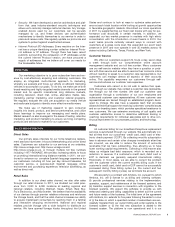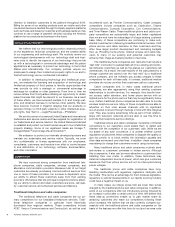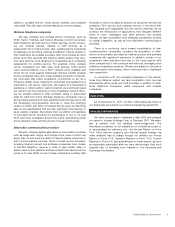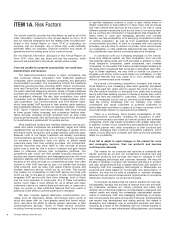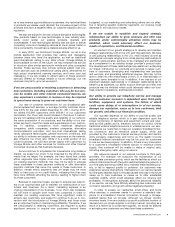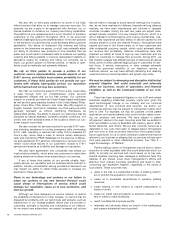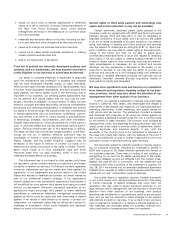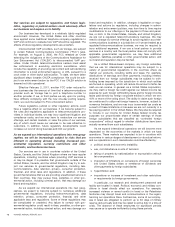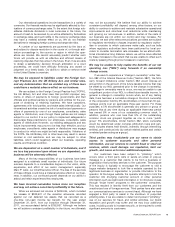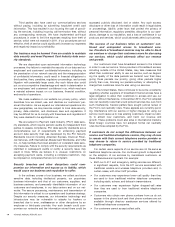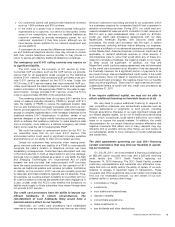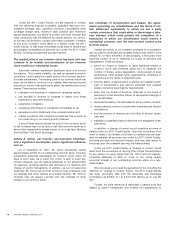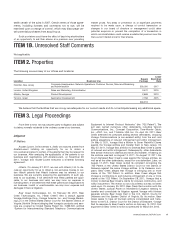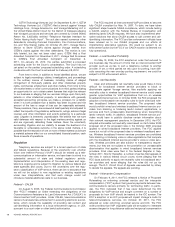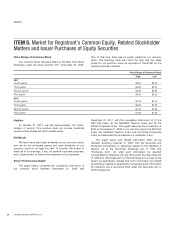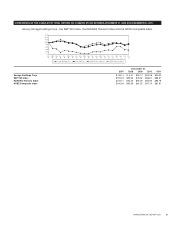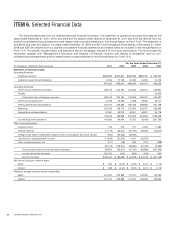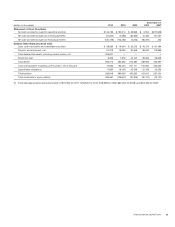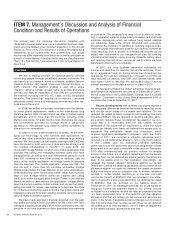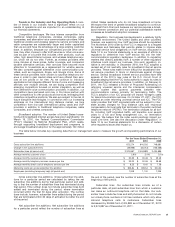Vonage 2011 Annual Report Download - page 23
Download and view the complete annual report
Please find page 23 of the 2011 Vonage annual report below. You can navigate through the pages in the report by either clicking on the pages listed below, or by using the keyword search tool below to find specific information within the annual report.>Our customers cannot call premium-rate telephone numbers
such as 1-900 numbers and 976 numbers.
>In the event of a power loss or Internet access interruption
experienced by a customer, our service is interrupted. Unlike
some of our competitors, we have not installed batteries at
customer premises to provide emergency power for our
customers’ equipment if they lose power, although we do
have backup power systems for our network equipment and
service platform.
If customers do not accept the differences between our serv-
ice and traditional telephone service, they may choose to remain
with their current telephone service provider or may choose to
return to service provided by traditional telephone companies.
Our emergency and E-911 calling services may expose us
to significant liability.
The FCC rules for the provision of 911 service by inter-
connected VoIP providers, such as the VoIP service we provide,
require that for all geographic areas covered by the traditional
wireline E-911 network, interconnected VoIP providers must pro-
vide E-911 service as defined by the FCC’s rules. Under the
FCC’s rules, E-911 service means that interconnected VoIP pro-
viders must transmit the caller’s telephone number and registered
location information to the appropriate PSAP for the caller’s regis-
tered location. Vonage provides E-911 service, under the FCC’s
rules, to approximately 99.99% of its subscriber lines.
The remaining subscriber lines do not have E-911 service for a
variety of reasons including refusal by PSAPs to accept VoIP 911
calls, the inability of PSAPs to receive the registered location data
from us, and the failure by third party companies with whom we con-
tract to provide aspects of our E-911 service to obtain the necessary
access or complete implementation of the necessary interfaces to the
traditional wireline E-911 infrastructure. In addition, certain of our
services designed to be highly mobile including soft phone service,
which is software that enables a customer to make telephone calls
from a computer, route callers to a national emergency call center
that in turns routes the call to the appropriate PSAP.
We could be subject to enforcement action by the FCC for
our subscriber lines that do not have E-911 service. This
enforcement action could result in significant monetary penalties
and restrictions on our ability to offer non-compliant services.
Delays our customers may encounter when making emer-
gency services calls and any inability of a PSAP to automatically
recognize the caller’s location or telephone number can have
devastating consequences. Customers have attempted, and may
in the future attempt, to hold us responsible for any loss, damage,
personal injury or death suffered as a result. In July 2008, the New
and Emerging Technologies 911 Improvement Act of 2008
became law and provided that interconnected VoIP providers
have the same protections from liability for the operation of 911
service as traditional wireline and wireless providers. Limitations
on liability for the provision of 911 service are normally governed
by state law and these limitations typically are not absolute. Thus,
for example, we could be subject to liability for a problem with our
911 service where our failures are greater than mere negligence. It
is also unclear under the FCC’s rules whether the limitations on
liability would apply to those subscriber lines where Vonage does
not provide E-911 service.
Our credit card processors have the ability to impose sig-
nificant holdbacks in certain circumstances. The
reinstatement of such holdbacks likely would have a
material adverse effect on our liquidity.
Historically, our credit card processors have established
reserves to cover any exposure that they may have as we collect
revenue in advance of providing services to our customers, which
is a customary practice for companies that bill their customers in
advance of providing services. During 2010, our credit card pro-
cessors released all reserves which consisted of cash reserves of
$23,101 and a cash-collateralized letter of credit for $10,500.
Under our credit card processing agreements with our Visa,
MasterCard, American Express, and Discover credit card
processors, the credit card processor has the right, in certain
circumstances, including adverse events affecting our business,
to impose a holdback of our advanced payments purchased using
a Visa, MasterCard, American Express, or Discover credit card, as
applicable, or demand additional reserves or other security. If
circumstances were to occur that would allow any of these pro-
cessors to reinstate a holdback, the negative impact on our liquid-
ity likely would be significant. In addition, our Visa and
MasterCard credit card processing agreement may be terminated
by the credit card processor at its discretion if we are deemed to
be financially insecure. As a significant portion of payments to us
are made through Visa and MasterCard credit cards, if the credit
card processor does not assist in transitioning our business to
another credit card processor, the negative impact on our liquidity
likely would be significant. There were no cash reserves and cash-
collateralized letters of credit with any credit card processors as
of December 31, 2011.
If we require additional capital, we may not be able to
obtain additional financing on favorable terms or at all.
We may need to pursue additional financing to respond to
new competitive pressures, pay extraordinary expenses such as
litigation settlements or judgments or fund growth, including
through acquisitions. Because of our past significant losses and
our limited tangible assets, we do not fit traditional credit lending
criteria, which, in particular, could make it difficult for us to obtain
loans or to access the capital markets. In addition, the credit
documentation for our recent financing contains affirmative and
negative covenants that affect, and in many respects may sig-
nificantly limit or prohibit, among other things, our and certain of
our subsidiaries’ ability to incur, refinance or modify indebtedness
and create liens.
The debt agreements governing our July 2011 financing
contain restrictions that may limit our flexibility in operat-
ing our business.
On July 29, 2011, we consummated a financing consisting of
an $85,000 senior secured term loan and a $35,000 revolving
credit facility (the “2011 Credit Facility”) replacing our
December 14, 2010 financing. The 2011 Credit Facility contains
customary representations and warranties and affirmative cove-
nants that limit our ability and/or the ability of certain of our sub-
sidiaries to engage in specified types of transactions. These
covenants and other restrictions may under certain circumstances
limit, but not necessarily preclude, our and certain of our sub-
sidiaries’ ability to, among other things:
>consolidate or merge;
>create liens;
>incur additional indebtedness;
>dispose of assets;
>consummate acquisitions;
>make investments; or
>pay dividends and other distributions.
VONAGE ANNUAL REPORT 2011 15


